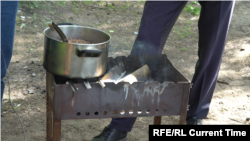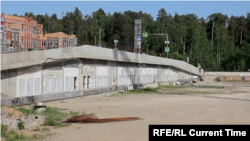MOSCOW -- Three times per week, residents of a residential estate outside Moscow whip out a portable kitchen and cook lunch outside their homes. They're not lured out by the unexpected May heatwave, but by the four-hour electricity cutoffs that begin at noon.
Fridges thaw, food spoils, elevators grind to a halt, and the hot water turns cold.
"We chip in 50 or 100 rubles each to feed the kids when they return from school," Irakly Pachulia, one of the residents, told Current Time as he stirred a pot of buckwheat in the courtyard.
Local energy provider Mosenergysbyt says residents of the Edelweiss Comfort housing estate in Balashikha have racked up arrears exceeding 35 million rubles ($537,000).
But the truth may be more complex.
In November 2018, inside a row of garages below a driveway that runs alongside the five housing blocks, residents discovered a huge bitcoin farm. Rows of computers hummed and churned out electricity as they solved cryptographic puzzles to generate the lucrative digital currency.
When residents provided police with photo evidence of the "mining" operation, law enforcement conducted a raid on the premises that was broadcast on Russian state TV. Federal channels laid the blame on Konstantin Zolotukhin, a businessman whose construction company built Edelweiss Comfort and who later declared himself head of its homeowners association.
Zolotukhin has bounced back from a precipitous fall from grace in the mid-2000s. In 2005, the year after he was named Person of the Year at a Kremlin awards ceremony for achievements in business, he was placed on an Interior Ministry wanted list as part of a high-profile fraud investigation.
Zolotukhin portrayed those charges as part of a campaign by his competitors in Moscow's lucrative construction industry, and continued to do business. In a March 2019 interview with Kommersant, he boasted of 40 separate companies under his name. He blamed debts racked up by Edelweiss Comfort on its residents. "They don't want to pay for utility services," he said.
And so far, the dispute over Edelweiss Comfort's debt appears to have left him unscathed. It was only on May 21, over six months after video of their raid was broadcast to the nation, that the authorities publicly announced an investigation into the estate's utility arrears.
In the meantime, residents say accounts tied to the homeowners association have been frozen. According to Anton Zhuravkin, money they're paying for utility bills is instead being used to settle a payout the energy provider has won in court. It never reaches the companies that are supposed to supply the estate with water and arrange trash disposal, so the debt only grows.
"We're paying for light, for water, for elevator maintenance," Pachulia, one of the residents, said. "But we can't use any of it."






